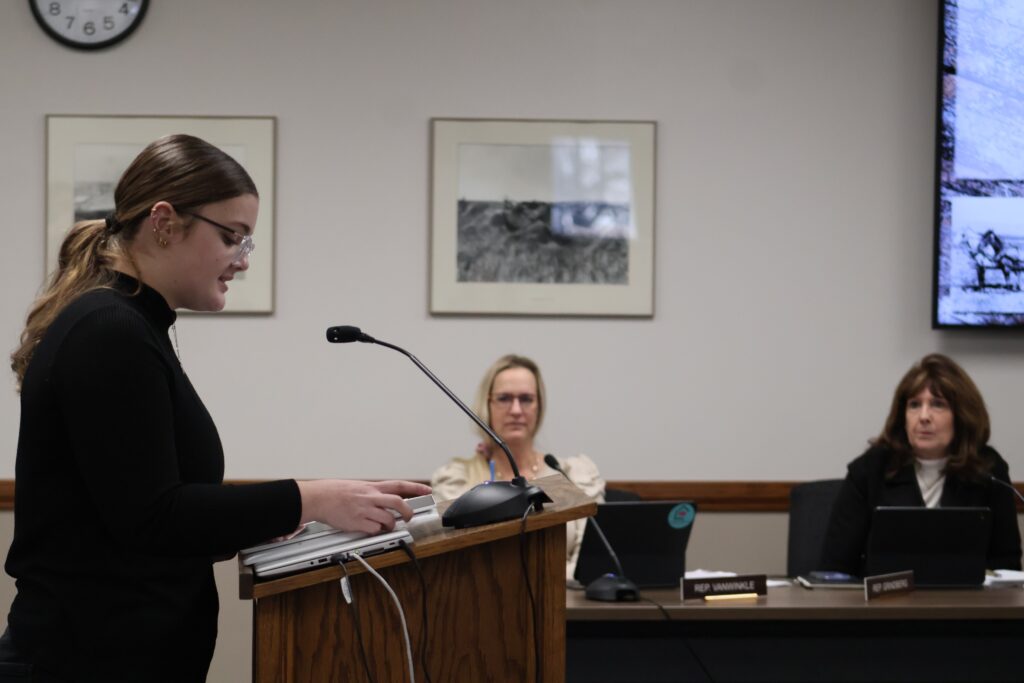Nina Kritzberger, 16, speaks before the Government and Veterans Affairs Committee in support of insulin caps in North Dakota’s commercial insurance market on January 9, 2025. (Mary Stuerer/North Dakota Monitor)
A bill to lower the price of insulin drugs and supplies for more North Dakotans drew heated debate during Thursday’s hearing in the House Government and Veterans Affairs Committee.
House Bill 1114 We plan to set the out-of-pocket cost for a monthly supply of insulin at $25 for North Dakota’s commercial insurance market. It would also place a $25 monthly cap on medical supplies used to administer insulin.
See more 2025 Congressional coverage
The new cap will affect individual, small group, and large group insurance plans in North Dakota’s fully insured market. This bill does not apply to the self-insured market.
Advocacy groups said the cap would be lifesaving for diabetics who rely on insulin to survive.
Nina Kritzberger, 16, said living with type 1 diabetes is a life of uncertainty. Your family’s insurance plan covers some of the costs, but you don’t know what coverage you’ll receive as an adult.
“I think in the back of my head every day, if this bill doesn’t pass, I might not be here in the future,” Kritzberger, a Hillsborough resident, said Thursday.
Danelle Johnson of Horace said she and her daughter, Danica, both live with diabetes. She told lawmakers her family still spends thousands of dollars on diabetes-related expenses.
“It’s cost us over $10,000 every year since my daughter was diagnosed,” she said.
Representatives from insurance companies testified against the bill, arguing that the cap would only shift costs to other parties, such as insurance companies and employers.
“Instituting a cap on out-of-pocket costs is like putting a Band-Aid on a wound that won’t heal,” Megan Hruby, representing Blue Cross Blue Shield of North Dakota, told the committee. “Pharmaceutical companies are still free to set the price of insulin, so it does nothing to solve the fundamental problem of pricing.”
Dylan Wheeler, director of government affairs for Sanford Health Plan, said the high prices could be a patent or antitrust issue.
“When we put a cap on the price of something, we’re ignoring the fundamental problem,” Wheeler said. “We generally oppose mandates because they inhibit our members’ ability to innovate and create their own plans.”
It’s unclear exactly how many North Dakotans would be affected by the proposed cap, but Wheeler estimated the mandate would affect about a quarter of the state’s health insurance market.
“Mr. Wheeler, you know very well that we are in North Dakota, but when you use the word ‘mandate,’ some of the people here start to get scared,” the Republican said. , said Rep. Austin Schauer of West Fargo. Serve as committee chair. “But when you try to weigh that against the sacrifices of Ninas around the world, you’re faced with a bit of a dilemma.”
The North Dakota Department of Insurance provided neutral testimony on this bill. Crystal Bartuska, the agency’s director of life and health, made some changes to the bill to make the language more consistent with the agency’s standards.
The committee took no immediate action Thursday. Schauer asked U.S. Rep. Carrie McLeod (R-Fargo) to work with PERS and the North Dakota Department of Insurance on the amendment.
Insulin caps are already being piloted for state employee health plans starting in 2023.
Under state law, North Dakota must first test health insurance requirements for state employees before introducing health insurance into North Dakota’s commercial market.
The 2023 law that created the pilot program requires PERS to introduce follow-up legislation this Congress that would expand the general state insurance market price cap.
The three largest manufacturers in the U.S. insulin market, Eli Lilly, Novo Nordisk, and Sanofi, have all recently lowered the cost of their insulin products.
Because of these price reductions, the PERS Board determined that the testing program would not result in significant costs to the state.
a study Submitted by PERS to Interim Employee Benefits Committee They found that continuation of the cap for the biennium from 2025 to 2027 would increase claims costs for state insurance programs by an estimated 0.12%, or approximately $1 million.
of accounting notes House Bill 1114, which is attached to the bill, estimates the cost to the state to be approximately $834,000.
The study also reported that as of August, 24 states and Washington, D.C., had also implemented insulin price caps for state-regulated commercial health insurance plans.
new insulin cap took effect January 1 marks the launch of Affordable Care Act-compliant individual and small group plans in North Dakota.
